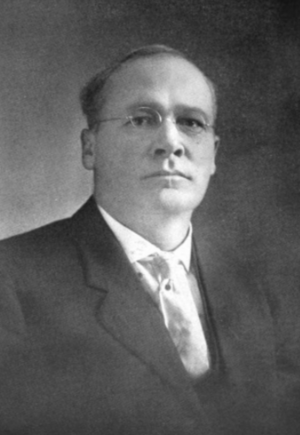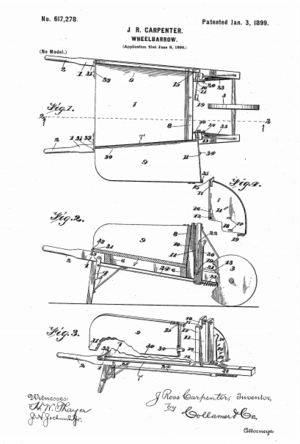James R. Carpenter facts for kids
Quick facts for kids
James R. Carpenter
|
|
|---|---|
 |
|
| Member of the Wyoming Senate from Laramie County | |
| In office 1911–1915 |
|
| Personal details | |
| Born |
James Ross Carpenter
August 7, 1867 Monmouth, Illinois, U.S. |
| Died | January 27, 1943 (aged 75) Cheyenne, Wyoming, U.S. |
| Resting place | Lakeview Cemetery, Cheyenne, Wyoming, U.S. |
| Political party | Democratic |
| Spouse | Fanny May Russell |
| Children | 3 |
| Parents |
|
| Education | Monmouth College National Normal University |
| Signature | |
James Ross Carpenter (born August 7, 1867 – died January 27, 1943) was an important person in Wyoming. He was a politician and an inventor. He served in the Wyoming Senate, which is like a state parliament. He was part of the Democratic Party. Before becoming a politician, he helped start and promote several towns in Wyoming.
Contents
Early Life and Education
James Ross Carpenter was born on August 7, 1867, in Monmouth, Illinois. His parents were George Daniel Carpenter and Margery Ann Pollock. He went to public schools in Illinois and Kansas. Later, he graduated from Monmouth College and the National Normal University.
On September 15, 1887, he married Fanny May Russell. They had three children together.
Carpenter's Career
Inventor and Town Founder
From 1887 to 1892, James Carpenter worked as a rancher in western Kansas. He then moved to Des Moines, Iowa, where he lived until 1907. In 1907, he moved to Wyoming.
In Wyoming, he helped create the town of Carpenter, Wyoming, which was named after him. He also helped start and advertise other Wyoming towns, like Burns, Wyoming. In 1905, he founded the Federal Land Company to help with this work.
James Carpenter was also an inventor. On June 8, 1898, he applied for a patent for a wheelbarrow. This special wheelbarrow had parts that could be taken apart. He received the patent on January 3, 1899. Later, on December 19, 1936, he filed another patent. This one was for a way to cut agatized petrified wood.
Serving in Wyoming Politics
In 1910, James Carpenter was elected to the Wyoming Senate. He represented Laramie County and was a member of the Democratic Party.
In 1912, Governor Joseph M. Carey chose him to be a delegate. This meant he would represent Wyoming at the National Farm Congress. During the 1913 Senate election, Carpenter supported John B. Kendrick for a U.S. Senate seat. However, Kendrick did not win the election. Carpenter served in the Wyoming Senate until 1915.
He also held other political roles. In 1912, he became Wyoming's Democratic Congressional committeeman. From 1914 to 1916, he was the chairman of the Democratic Central Committee for Laramie County. In 1916, he was chosen as a delegate to the 1916 Democratic National Convention. This is a big meeting where the Democratic Party chooses its candidate for president.
Running for U.S. House of Representatives
James Carpenter supported the idea of prohibition. This was a time when making and selling alcohol was against the law in the United States. In 1932, he supported Perry W. Jenkins in a political race. Jenkins was running against Vincent Carter, who was against the 18th Amendment (the law that started prohibition).
On September 13, 1932, Carpenter announced he would run for the United States House of Representatives. He ran as an independent candidate, meaning he wasn't part of a major party. He officially filed to run on September 26 as the nominee for the American Party. In the main election, he finished in fourth place.
Later Life and Legacy
After the 18th Amendment was ended, James Carpenter still believed in prohibition. He was against the sale of alcohol in the town of Carpenter, Wyoming.
James Ross Carpenter passed away on January 27, 1943. He died at his home in Cheyenne, Wyoming, after being ill for two months.
Electoral History
| 1932 Wyoming at-large congressional district election | |||||
|---|---|---|---|---|---|
| Party | Candidate | Votes | % | ±% | |
| Republican | Vincent Carter (incumbent) | 5,670 | 51.84% | ||
| Democratic | Paul Ranous Greever | 5,040 | 46.08% | ||
| Socialist | W. W. Wolfe | 126 | 1.15% | ||
| American | James R. Carpenter | 90 | 0.82% | ||
| Communist | George Morphis | 11 | 0.10% | ||
| Total votes | 10,937 | 100.00% | |||
 | William Lucy |
 | Charles Hayes |
 | Cleveland Robinson |


